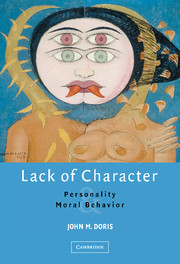Book contents
- Frontmatter
- Contents
- Preface: A Renaissance of Virtue
- Lack of Character
- 1 Joining the Hunt
- 2 Character and Consistency
- 3 Moral Character, Moral Behavior
- 4 The Fragmentation of Character
- 5 Judging Character
- 6 From Psychology to Ethics
- 7 Situation and Responsibility
- 8 Is There Anything to Be Ashamed Of?
- Notes
- References
- Acknowledgments
- Author Index
- Subject Index
2 - Character and Consistency
Published online by Cambridge University Press: 05 July 2014
- Frontmatter
- Contents
- Preface: A Renaissance of Virtue
- Lack of Character
- 1 Joining the Hunt
- 2 Character and Consistency
- 3 Moral Character, Moral Behavior
- 4 The Fragmentation of Character
- 5 Judging Character
- 6 From Psychology to Ethics
- 7 Situation and Responsibility
- 8 Is There Anything to Be Ashamed Of?
- Notes
- References
- Acknowledgments
- Author Index
- Subject Index
Summary
The myth they chose was the constant lovers.
The theme was richness over time.
It is a difficult story and the wise never choose it
because it requires a long performance
and because there is nothing, by definition, between the acts.
Robert HassCharacter and personality traits are invoked to explain what people do and how they live: Peter didn't mingle at the party because he's shy, and Sandra succeeds in her work because she's diligent. Traits also figure in prediction: Peggy will join in because she's impulsive, and Brian will forget our meeting because he's absentminded. So too for those rarefied traits called virtues: James stood his ground because he's brave, and Katherine will not overindulge because she's temperate. Such talk would not much surprise Aristotle (1984: 11O6a14—23); for him, a virtue is a state of character that makes its possessors behave in ethically appropriate ways. I'll now begin arguing that predictive and explanatory appeals to traits, however familiar, are very often empirically inadequate: They are confounded by the extraordinary situational sensitivity observed in human behavior. Discussion of the descriptive psychology occupies me for several chapters; afterward, I'll be positioned to address related normative concerns.
Traits and Consistency
Dispositions
As I understand it, to attribute a character or personality trait is to say, among other things, that someone is disposed to behave a certain way in certain eliciting conditions. In philosophy, this seems a standard interpretation: Character traits, and virtues in particular, are widely held to involve dispositions to behavior.
- Type
- Chapter
- Information
- Lack of CharacterPersonality and Moral Behavior, pp. 15 - 27Publisher: Cambridge University PressPrint publication year: 2002

